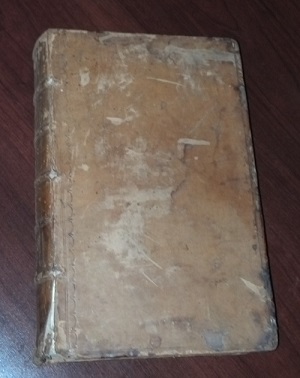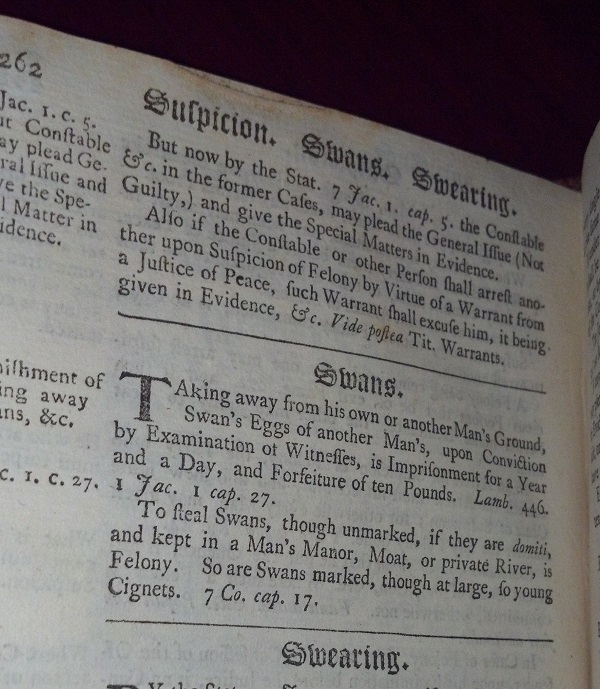18th century laws from England
I've decided to read through some of my old books, and see if I can find anything that is particularly interesting. This article is based on the Practical Justice of Peace (printed in England, 1744), which is in English.

This is a guide to justices of peace, meant to assist with matters as diverse as brick making, poor people, swan theft, tobacco, prices for services, etc. I've tried to reproduce the quotations as well as I could; the seemingly random capitalization is actually not random; nouns are consistently capitalized. Research shows that this was a passing trend in modern written English in the 17th and 18th century.
It is quite a large book (over 700 pages), which I have attached in PDF format here. If you take the time to read through it, I'm sure you will find other interesting laws.
The more serious offences are considered felonies. The book doesn't provide any more details, but after research, I found out that felonies were punishable by death. Also, the punishment by "transportation" refers to the relocation of the criminal to a penal colony, such as Australia.
I have calculated the value of a 1700s pound sterling in today's money, and I've also confirmed using a website that it's somewhere near 150 pounds.
Therefore, monetary values in this book are as follows:
- one pound is equal to about $200 USD in 2013
- one shilling is equal to about $10 USD in 2013
- one penny is equal to about 85 cents US in 2013
While not particularly interesting, this section lists the fares for boat travel for various routes to and from London. They are a few shillings each (there were 20 shillings to the pound). I've looked this up, and currently a similar service exists, but now costs several pounds.
I found this to be hilarious because I never expected a section on swans. They sure liked their swans back then. One year prison for stealing swan eggs? And a fine of ten eighteenth century pounds to boot.
Not to mention:
This is insane. You were executed if you stole swans... My theory is that swans were exclusively owned by wealthy and influential households, being representative of their important status. As such, extreme importance was given to them.
Here's a photograph of the swan section as proof! However, I want to mention that if you thought swan policies are crazy, wait until you get to the Sheep section below!

So you swear, two people tell on you, and you're put in stocks for three hours. Unless you're a kid, in which case they whip you.
Are you kidding me? One year in jail for stealing swan eggs, but only one pound fine for detonating explosives in the street? Were they faced with a serious swan-related theft wave at the time?
I liked this because of its directness.
There is extensive coverage of various safety nets for the poor; a more direct device than we have today, whereas today we have complex organizations that deal with the poor, and through which aid funds flow. Probably less operational overhead back then as well, resulting in the poor getting a significantly larger share of the collected "for the poor" fine money than today.
Back then: "You're drunk, pay up five shillings. Okay, poor, here's five shillings."
Today: "Budgets, secretaries, TV ads, pamphlets. Okay, poor, here's one percent of what was initially collected."
Damn! So if you want to assault someone, better be careful not to trash their clothing.
Hehe, a hefty price for collusion here; first jail, then you lose an ear!
Privileged birds again!
I'm surprised by the harshness of the penalties. Remember that the punishment for felonies was death. I can't figure out why this one is so crazy.

This is a guide to justices of peace, meant to assist with matters as diverse as brick making, poor people, swan theft, tobacco, prices for services, etc. I've tried to reproduce the quotations as well as I could; the seemingly random capitalization is actually not random; nouns are consistently capitalized. Research shows that this was a passing trend in modern written English in the 17th and 18th century.
It is quite a large book (over 700 pages), which I have attached in PDF format here. If you take the time to read through it, I'm sure you will find other interesting laws.
The more serious offences are considered felonies. The book doesn't provide any more details, but after research, I found out that felonies were punishable by death. Also, the punishment by "transportation" refers to the relocation of the criminal to a penal colony, such as Australia.
I have calculated the value of a 1700s pound sterling in today's money, and I've also confirmed using a website that it's somewhere near 150 pounds.
Therefore, monetary values in this book are as follows:
- one pound is equal to about $200 USD in 2013
- one shilling is equal to about $10 USD in 2013
- one penny is equal to about 85 cents US in 2013
Witchcraft
"If any shall be convicted to have by Witchcraft, Sorcery, Charm, or Inchantment, undertaken to tell where any hidden Treasure or Goods lost or stolen may be found, or are become, or to provoke unlawful Love, or to destroy or hurt any Cattle, Goods or Person [...] they shall for the first Offence suffer one Year's Imprisonment without Bail"
Watermen
While not particularly interesting, this section lists the fares for boat travel for various routes to and from London. They are a few shillings each (there were 20 shillings to the pound). I've looked this up, and currently a similar service exists, but now costs several pounds.
Swans
"Taking away from his own or another Man's Ground Swan's Eggs of another Man's, upon Conviction by Examination of Witnesses, is Imprisonment for a Year and a Day, and Forfeiture of ten Pounds [$2000 USD]."
I found this to be hilarious because I never expected a section on swans. They sure liked their swans back then. One year prison for stealing swan eggs? And a fine of ten eighteenth century pounds to boot.
Not to mention:
"To steal Swans [...] is Felony"
This is insane. You were executed if you stole swans... My theory is that swans were exclusively owned by wealthy and influential households, being representative of their important status. As such, extreme importance was given to them.
Here's a photograph of the swan section as proof! However, I want to mention that if you thought swan policies are crazy, wait until you get to the Sheep section below!

Swearing
"[...] if any Person prophanely swear or curse in the Hearing of any Justice, Mayor, etc. or shall be convicted of such Swearing, etc by the Oath of two Witnesses [...] the Offender being above Twelve Years old, was to be set in the Stocks Three Hours; if under that Age [...] he was to be whipt by the Constable"
So you swear, two people tell on you, and you're put in stocks for three hours. Unless you're a kid, in which case they whip you.
Squibs (small explosives used in mining, or as detonators for larger payloads)
"If any Person shall throw, cast, or fire, or be aiding, and assisting in throwing, casting, or firing Squibs, etc. into any publick Street [...] he shall forfeit [one pound]"
Are you kidding me? One year in jail for stealing swan eggs, but only one pound fine for detonating explosives in the street? Were they faced with a serious swan-related theft wave at the time?
Prophesies
"If any one shall publish by Writing, Speech, or Deed, etc. any phantastical or false Prophesy [...] he shall for the first Offence be imprisoned a Year without Bail, and forfeit ten pounds, for the second Offence be imprisoned for Life, and forfeit all his Goods"
Poor
"1. Those who are able, but are not willing to work.
2. Those who are willing, but are not able to work."
2. Those who are willing, but are not able to work."
I liked this because of its directness.
There is extensive coverage of various safety nets for the poor; a more direct device than we have today, whereas today we have complex organizations that deal with the poor, and through which aid funds flow. Probably less operational overhead back then as well, resulting in the poor getting a significantly larger share of the collected "for the poor" fine money than today.
"A Person Convict of Drunkenness forfeits five shillings to the Poor. And one keeping an Alehouse without License one pound."
Back then: "You're drunk, pay up five shillings. Okay, poor, here's five shillings."
Today: "Budgets, secretaries, TV ads, pamphlets. Okay, poor, here's one percent of what was initially collected."
Alehouses
"Alehouse-keepers, Inn-keepers [...] selling less than one Quart for a Penny. [...] Twenty Shillings to be levied"
"Alehouse-keeper convicted of Drunkenness [...] Disabled to keep an Alehouse for three Years"
Arms
"One going or riding armed offensively, before the King's Justices, or other his Officers or Ministers, or elsewhere by Night or Day [...] To be apprehended and bound"
Butcher
"If any Butcher in London or Westminster, or in ten Miles thereof, buy fat Cattle, and sell them again, alive or dead, to another Butcher [...] Forfeits the Value of such Cattle, to be divided between the King and Prosecutor"
Clothes
"Willfully and malitiously to assault any Person in the publick Streets, or Highways, with an Intent to tear, spoil, cut, burn or deface, and who shall tear, spoil, cut, burn or deface the Garments or Clothes of any Person. If convicted, Felony and to be transported for seven Years."
Damn! So if you want to assault someone, better be careful not to trash their clothing.
Conspiracies
"Butchers, Brewers, Bakers, Poulterers, Cooks [...] who conspire, or promise together, that they will not sell their [wares] but at certain Prices [...] First Offence, ten pounds to the King and if not paid in six Days after Conviction, 20 Days Imprisonment, with Bread and Water [...] Third Offence, forty Pounds, and if not paid in six Days [...] Loss of an Ear"
Hehe, a hefty price for collusion here; first jail, then you lose an ear!
Hawks
"Unlawfully taking any Hawk, Hawk's Eggs [...] Three Months Imprisonment"
Privileged birds again!
Plague
"If any Person being infected with the Plague, who has no Sore upon him, go abroad and converse in Company. To be openly whipped as a Vagabond"
Sheep
"Transporting Sheep beyond Sea [...] First Offence Forfeiture of Goods, to be divided between the Queen and the Prosecutor. To be imprisoned for a Year, and to have his Hand cut off in some open Market.
Second Offence, Felony"
Second Offence, Felony"
I'm surprised by the harshness of the penalties. Remember that the punishment for felonies was death. I can't figure out why this one is so crazy.
Spirits
"Servants and others wittingly and willingly assisting in making Spirits [...] Six Months Imprisonment"
Books
"Selling, Printing, or Importing any superstitious Books forfeits forty shillings [...] Justices, etc. may search Houses, etc. for such Books [...] and burn them"